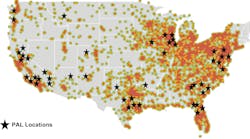One of the growing concerns for the transportation industry a year after September 11 is not only the prospect of terrorists turning its physical assets into weapons of mass destruction, but the potential to use the Internet as a weapon as well.
"I think about cyber-terrorism a lot, because if the data flow gets disrupted, all of those just-in-time delivery plans and inventory models go out the window," said Chuck Lounsbury, senior vp-supply chain for Miami-based third party logistics provider Ryder System. "That scenario keeps me awake at night."
A report from Internet security provider Riptech showed that Internet attacks grew at an annualized rate of 64% from January through June of this year, with public companies facing a 50% higher risk of cyber attack than either private firms or government entities.
Arlington, VA-based Riptech said its analysis revealed that a highly focused, small demographic of elite hackers comprising less than 1% of all cyber assailants cause the most damage. Riptech was purchased and absorbed by a larger firm in July of this year.
"One thing our report found was that the more visible a company is, the more vulnerable it is to attack," Riptech CTO Tim Belcher told Fleet Owner in July. "We're also starting to see a maturing in these attacks as groups and individuals committing these crimes get more sophisticated."
Michael Corby, president of Internet security firm QinetiQ Trusted Information Management, said in a recent speech that, until recently, there was a belief that cyber-terrorism had a negligible chance of occurring. Unless a business' mission was directly involved in military defense, or had politically volatile roots, cyber-terrorism was not a concern worth occupying either time or money, he said.
"However, by viewing cyber-terrorism as an inevitable event, not as a possible event, we can reorganize and reallocate our efforts to be more effective," Corby explained. "We can actually be more precise in answering how will it happen rather than wondering if it will happen."
Corby pointed out that today's terrorists are technology-savvy groups of specialists who can initiate a distributed denial of service attack as easily as they can strap a couple sticks of dynamite to a suicide bomber.
Worcester, MA-based QinetiQ is a subsidiary of QinetiQ PLC, one of Europe's leading security and defense technology companies. For commercial companies in the U.S. that use the Internet to provide and/or receive business services, Corby offered five cyber-security tips.
"First, you must focus on the fact that you are a target," he said. "This is especially true for part of the government and five business sectors of critical infrastructure: finance, health and safety, communications, transportation or public utilities."
Second, companies must put together what's called an "intrusion management strategy" and not just focus on detecting cyber-attacks.
"Security must be taken in a holistic business sense," Corby said. "That means understanding, planning, managing, detecting, responding, recovering and re-planning is critical to surviving cyber-attacks."
Third, Corby said companies must understand that patterns evolve and are not a surprise or unknown events.
"Before a system can be compromised, an attacker needs to identify the perimeter defense and needs to find a weakness in that defense that allows them to gain access to a meaningful application," he said. "So the earlier vulnerabilities and signs of cyber-attacks are recognized and corrective actions taken, the better the likelihood of ultimately resisting the security attack."
Fourth, humans can recognize patterns faster than they can analyze data, said Corby, so build Internet security around this skill. Let the computer store and organize data, which it does best, but let the human brain spot offending patterns, he explained.
"Attack recognition systems don't rely solely on hardware and software. They use that hardware and software to aid and assist a trained human expert," he added.
Finally, make sure your Internet systems are both resilient and easy to update. Corby said that's because cyber-terrorists mutate their attack signatures, so it is important to be able to change recognition methods and procedures for repelling such attacks quickly and effectively.
"There is not enough time to buy new equipment or change a software platform," he warned. "The solutions implemented must have the flexibility to morph itself to provide an ever stronger and unpredictable defense."


